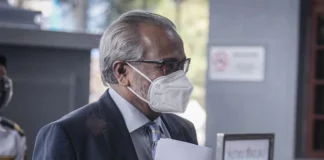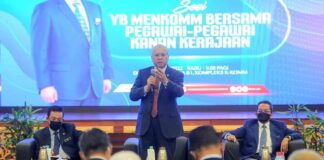Washington, Feb 8: A “good sense of mutual respect” is clearly needed to put U.S.-China ties back on “a stable and constructive track,” Chinese Ambassador to the United States Cui Tiankai has said.
“You don’t have an effective foreign policy just by talking tough or playing tough. This is not the right way of doing diplomacy. I think there is a clear need for good sense of mutual respect. People have to show good will and good faith,” said Cui in an interview aired Sunday with Fareed Zakaria GPS at CNN on China-U.S. relations.
“Frankly, my impression is that this readout still shows the example of power rather than the power of example,” said Cui, referring to the U.S. side’s readout of descriptions of a phone call between U.S. Secretary of State Antony Blinken and senior Chinese diplomat Yang Jiechi on Saturday.
“Of course, all countries have values and interests to defend. For China, national sovereignty, unity, territorial integrity, these are the core values and core interests we will defend, we will do whatever it takes to defend, no matter who says what,” said Cui.
“What has happened in our relations, what has been done by the United States, especially in the last few years, has antagonized the Chinese public very much. This is the truth,” he said.
“But I’m still confident if both sides could make the right choice, if we can put the relations back on a stable and constructive track, there’s a great potential and opportunity for our two countries, our two great peoples, to work together for mutual benefit and for the common benefit of the entire world,” he said.
A few basic things about China must be kept in mind when talking about policies toward China, the ambassador said.
China’s development, China’s growth, has been made possible by the hard work of the Chinese people and our more than 40 years of reform and opening-up, Cui said, “this is a historical fact. To say otherwise is against the facts and certainly not fair to the Chinese people.”
China is still a developing country with huge challenges ahead despite great achievements made over the years, he said, taking for example the country’s prolonged battle against poverty, climate change and natural disasters, an earnest pursuit of greater domestic economic and social development to improve people’s livelihoods as well as a global community with a shared future along with other countries.
On the current global fight against COVID-19, Cui said it is against the spirit of humanitarianism to politicize the COVID-19 origin-tracing as the world is still under the threat of the pandemic.
“I think people have to be careful not to make groundless accusations,” he said, adding that now a group of experts from the World Health Organization (WHO) are working in the central Chinese city of Wuhan with their Chinese counterparts.
Cui said he has also participated in some conferences between Chinese and foreign experts.
“They are real scientists. They are looking at the whole pandemic from the point of view of scientists, not any politicians,” he said.
The ambassador said there’s a certain need for more tracing to be done all over the world in order to really trace down the origin of the virus as there have been a number of media reports about early cases in other countries. “So the human race could be better prepared when we are faced with another virus again.”
On handling regional affairs, the Chinese ambassador believed that it will be “easier and more possible” for Asian neighbors to solve their issues without external involvement.
“So who is on the offensive, who is on the defensive, you just have a look at the map … all the issues you mentioned and some other issues are either part of Chinese territory or in places very close to China,” said Cui, responding to a question about the so-called China’s “much more assertive” foreign policy.
The ambassador said China has been very consistent in its foreign policy. “It’s an independent policy of peace. Of course, we safeguard our sovereignty and independence. There’s no doubt about that.”
China and its neighbors have been able to address their disputes and solve them through dialogue and negotiation, Cui said, noting China has concluded land border treaties and agreements with most of its neighbors.



















